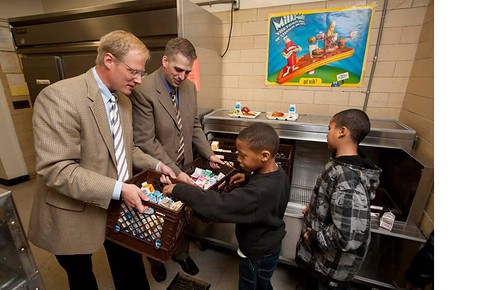
Across the nation, schools are responding to the Let’s Move! initiative by providing students with a wide range of healthy food choices. But making the healthy option available is not enough—it’s not nutrition unless children select it and eat it. So the U.S. Department of Agriculture (USDA) is complementing these efforts with research on how to encourage children to make healthful food choices at school, drawing on the new field of behavioral economics. We recently announced a $1 million USDA-funded award to establish the Cornell Center for Behavioral Economics in Child Nutrition Program. Headed by David Just and Brian Wansink, the Center will lead, coordinate and disseminate research that applies behavioral economics to child nutrition program operations and activities.
Research—and years of parent experience—has shown that children, just like adults, may find it hard to resist a tasty treat today for the sake of health tomorrow. USDA is looking at how kids make choices, which in turn can help steer them toward healthful choices. The Cornell Center [or, USDA-funded] studies draw on the fields of economics and social psychology to better understand how people make decisions. It sheds light on how we may be unconsciously influenced by how choices are presented, by various incentives, by the effort involved in making choices, and by visual or sensory cues.
For example, it is always easier to make the default choice—to choose, for example, the type of milk offered by the school cafeteria worker, rather than asking for a different milk. So why not make lowfat milk the default? Allowing pre-payment for school meals while requiring cash payment for dessert and snack items can discourage students from buying too many “extras.” The layout of the cafeteria can be designed to promote a healthy “choice architecture”—for example, by placing the salad bar where students have to walk past it.
These and other ideas suggested by the studies will be tested for their effectiveness in promoting healthy food choices. Findings will be communicated to researchers, policy makers, program officials and parents.
Ultimately, this research will help us address the challenges we face when it comes to the health and nutrition of our kids. We know that about a third of American children are overweight or obese and many kids consume half of their daily calories at school. Children who are obese can face lifelong struggles with their weight: 80 percent of teenagers who are obese remain obese as adults. That increases their risk of suffering from certain cancers and chronic diseases like diabetes, heart disease, asthma, and high blood pressure. We know that if we can influence the choices our kids make today, they can establish healthy habits that will last a lifetime.
Rebuilding and revitalizing America requires the next generation to be the healthiest and best educated in our history. We won’t succeed if our school environments and our students aren’t healthy. The potential impact of this research is enormous and it can help make sure our children have the opportunity for a healthy start in life. Our kids deserve nothing less.

